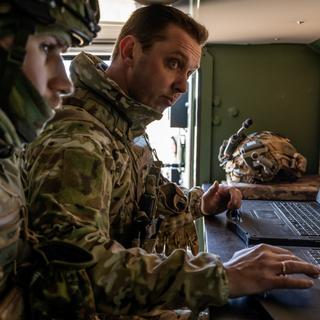


Ukraine: The perils of enemy observation at the Donbas front
FeatureSurveillance drone operators are essential for attacking logistics deep behind Russian lines. For this reason, they are a priority target for opposing artillery.
"Pack it up, guys. We've been spotted." Commander Yuri, nom de guerre "Commerce," had just been warned that two Russian Orlan surveillance drones were flying nearby, some 15 kilometers from enemy lines in the Donetsk region. Driving a Roshel Senator armored vehicle, donated by Canada, he had just gotten to the scheduled area of operations. In this windy end of February, Commerce, 38, a decorator in civilian life, and his three subordinates were preparing to fly a locally-made Leleka (Ukrainian for "stork") surveillance drone. The operation had to be postponed.
Today, fixed-wing drones of this type play a crucial role in the war against the Russian invaders, by observing the enemy in depth, far behind the front lines. Every brigade in the Ukrainian army has a reconnaissance battalion, with one or more drone-equipped aerial reconnaissance units. Their mission consists of finding high-value targets such as electronic warfare equipment (EWE), long-range artillery, heavy armor, command posts, and logistics centers.
Commander Yuri ordered the crates containing the drone and the antenna to be quickly repacked into the back of the powerful armored vehicle. The team set to work without haste. Commerce got back behind the wheel, did a U-turn, and accelerated down a muddy track lined by a hedge of trees. "Once you're spotted, you can cop a volley of artillery within two minutes," he explained.
A few hundred meters down the road, he looked for a spot under the trees to park his vehicle and resume the operation. The camouflage offered by the vegetation remained precarious. In the late winter, branches only partially conceal the ground. A space was found and the vehicle was parked in reverse, so the rear door would open onto a field suitable for launching the drone.

Explosions and the crackling of submunitions reverberated almost continuously. The town of Toretsk, just a few kilometers away, was under Russian artillery fire. The danger of being the target of a slew of rockets remained high, as drone operators are a priority target for both sides.
Two months' training to master the Leleka drone
The commander suggested waiting a while in a "blindage" (a shelter dug underground, topped by tree trunks to protect from the direct impact of a projectile). "Blade," "Kort" and "Konoval," his three assistants, did not wait. They began unpacking the equipment from the vehicle: The case containing the drone, then the one with the antenna needed to transmit the radio control and video signals between the operator and the device. It took about 10 minutes to unfold the antenna, assemble the wings to the drone's stabilizer, and set up the interior of the armored vehicle.
You have 57.41% of this article left to read. The rest is for subscribers only.
